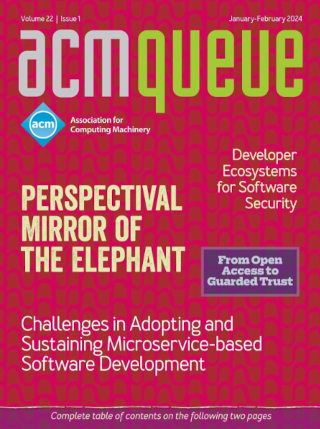
Scaling Synchronization in Multicore Programs:
Advanced synchronization methods can boost the performance of multicore software.
Designing software for modern multicore processors poses a dilemma. Traditional software designs, in which threads manipulate shared data, have limited scalability because synchronization of updates to shared data serializes threads and limits parallelism. Alternative distributed software designs, in which threads do not share mutable data, eliminate synchronization and offer better scalability. But distributed designs make it challenging to implement features that shared data structures naturally provide, such as dynamic load balancing and strong consistency guarantees, and are simply not a good fit for every program. Often, however, the performance of shared mutable data structures is limited by the synchronization methods in use today, whether lock-based or lock-free. To help readers make informed design decisions, this article describes advanced (and practical) synchronization methods that can push the performance of designs using shared mutable data to levels that are acceptable to many applications.
Cloud Calipers:
Naming the next generation and remembering that the cloud is just other people’s computers
For the time being, we are likely to continue to have programmers who version their functions as a result of the limitations of their languages, but let’s hope we can stop them naming their next generations after the next generation.
Fresh Starts:
Just because you have been doing it the same way doesn’t mean you are doing it the right way.
I love fresh starts. Growing up, one of my favorite things was starting a new school year. From the fresh school supplies to the promise of a new class of students, teachers, and lessons, I couldn’t wait for summer to be over and to go back to school. The same thing happens with new jobs. They reinvigorate you, excite you, and get you going.
The Power of Babble:
Expect to be constantly and pleasantly befuddled
Metadata defines the shape, the form, and how to understand our data. It is following the trend taken by natural languages in our increasingly interconnected world. While many concepts can be communicated using shared metadata, no one can keep up with the number of disparate new concepts needed to have a common understanding.
Functional at Scale:
Applying functional programming principles to distributed computing projects
Modern server software is demanding to develop and operate: it must be available at all times and in all locations; it must reply within milliseconds to user requests; it must respond quickly to capacity demands; it must process a lot of data and even more traffic; it must adapt quickly to changing product needs; and in many cases it must accommodate a large engineering organization, its many engineers the proverbial cooks in a big, messy kitchen.
React: Facebook’s Functional Turn on Writing JavaScript:
A discussion with Pete Hunt, Paul O’Shannessy, Dave Smith and Terry Coatta
One of the long-standing ironies of user-friendly JavaScript front ends is that building them typically involved trudging through the DOM (Document Object Model), hardly known for its friendliness to developers. But now developers have a way to avoid directly interacting with the DOM, thanks to Facebook’s decision to open-source its React library for the construction of user interface components.
Research for Practice: Web Security and Mobile Web Computing:
Expert-curated Guides to the Best of CS Research
Our third installment of Research for Practice brings readings spanning programming languages, compilers, privacy, and the mobile web.
10 Optimizations on Linear Search:
The operations side of the story
System administrators (DevOps engineers or SREs or whatever your title) must deal with the operational aspects of computation, not just the theoretical aspects. Operations is where the rubber hits the road. As a result, operations people see things from a different perspective and can realize opportunities outside of the basic O() analysis. Let’s look at the operational aspects of the problem of trying to improve something that is theoretically optimal already.





